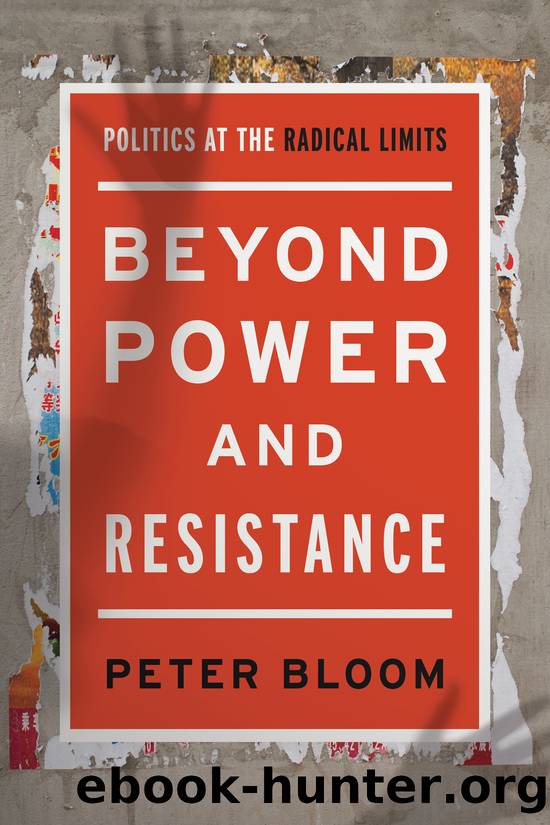Beyond Power and Resistance: Politics at the Radical Limits by Peter Bloom

Author:Peter Bloom [Bloom, Peter]
Language: eng
Format: epub
ISBN: 9781783487530
Google: uv0ZjgEACAAJ
Goodreads: 29280321
Publisher: Rowman & Littlefield International
Published: 2016-11-09T00:00:00+00:00
Chapter 6
Breaking Free from Power and Resistance
Resistance remains perhaps the most powerful force for change in the world today. The prospect for social transformation depends on individual and collective struggles that take on the status quo. And yet its historical counterpoint â the yin to its critical yang â namely sovereignty seems to be increasingly on the wane. Globalization and financialization have supposedly disempowered governments, relying instead on processes of self-disciplining and privatized regimes of control for their contemporary domination. Further, the new millennium has raised fresh questions regarding the ultimate futility of resistance. The utopian ideologies of communism and capitalism have been consigned to the dustbin of history or laid bare as an oligarchy for which there is no credible or ârealisticâ alternative. Nevertheless, new social movements have emerged and the potential for liberation is being reawakened internationally. The danger is that these radical aspirations will become lost in the eternal cycle of sovereign competition â victims to a chronological and psychic history that threatens permanent stasis even as it promises future progress. As the twenty-first century progresses, it is imperative to ask whether it is possible to break free from power and resistance.
Significantly, the internal tensions plaguing resistance are increasingly being revealed. Indeed, resistance is fundamentally paradoxical â in so much as it demands change yet does so as part of a hegemonic set of beliefs, norms, practices and social orderings. Even more so, the battle against authority â ideological or institutional â is now a familiar and incorporated part of the contemporary social fabric. As Cresswell (2000: 259) wryly observes, âIt is not unlikely that we shall soon have policing as resistance, conformity as resistance, and perhaps domination as resistanceâ. In this guise, there appears the veneer of radicalism that at its most effective may lessen the influence and power of certain elites but does little to upset the prevailing order as a whole.
Into this void, resistance threatens to become as much a social identity as it does a catalyst for radical social reorganization. The buzzwords of the status quo are âcreativityâ, âinnovationâ, even ârevolutionâ â all in the service of greater profit and a world that can continually update itself without ever having to do a fundamental reboot of its assumptions and social relations. This situation echoes Marxâs famous proclamation about human nature and capitalism:
The bourgeoisie cannot exist without constantly revolutionizing the instruments of production, and thereby the relations of production, and with them the whole relations of society. Conservation of the old modes of production in unaltered forms, was, on the contrary, the first condition of existence for all earlier industrial classes. Constant revolutionizing of production, uninterrupted disturbance of all social conditions, everlasting uncertainty and agitation, distinguish the bourgeois epoch from all earlier ones. All fixed, fast-frozen relations, with their train of ancient and venerable prejudices and opinions, are swept away; all new-formed ones become antiquated before they can ossify. All that is solid melts into air, all that is holy is profaned, and man
Download
This site does not store any files on its server. We only index and link to content provided by other sites. Please contact the content providers to delete copyright contents if any and email us, we'll remove relevant links or contents immediately.
| Anarchism | Communism & Socialism |
| Conservatism & Liberalism | Democracy |
| Fascism | Libertarianism |
| Nationalism | Radicalism |
| Utopian |
The Secret History by Donna Tartt(19092)
The Social Justice Warrior Handbook by Lisa De Pasquale(12191)
Thirteen Reasons Why by Jay Asher(8912)
This Is How You Lose Her by Junot Diaz(6889)
Weapons of Math Destruction by Cathy O'Neil(6281)
Zero to One by Peter Thiel(5802)
Beartown by Fredrik Backman(5756)
The Myth of the Strong Leader by Archie Brown(5509)
The Fire Next Time by James Baldwin(5448)
How Democracies Die by Steven Levitsky & Daniel Ziblatt(5219)
Promise Me, Dad by Joe Biden(5154)
Stone's Rules by Roger Stone(5088)
A Higher Loyalty: Truth, Lies, and Leadership by James Comey(4964)
100 Deadly Skills by Clint Emerson(4927)
Rise and Kill First by Ronen Bergman(4790)
Secrecy World by Jake Bernstein(4753)
The David Icke Guide to the Global Conspiracy (and how to end it) by David Icke(4720)
The Farm by Tom Rob Smith(4514)
The Doomsday Machine by Daniel Ellsberg(4490)
